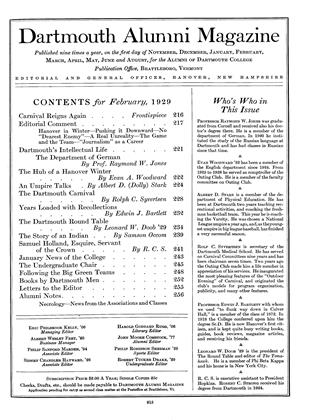By Ozora S. Davis '89. New York: The Maemillan Company, 1928.
This little book that fits the inside pocket of one's coat comes from the lecture room into modern life to answer two questions which have sprung up since the great war. The first is presented by men and women"- Why should I give my money and service to the church?" The second offered by young people seeking to define their vocation is "What valid claims has the church upon my life that I should devote myself to its leadership?"
Though these lectures were given before the Pacific School of Religion, Berkeley, California, in September, 1928, they face directly and squarely the situation outside seminary walls and are wholesome and helpful thinking for earnest people anywhere. It is a layman's book. The man or woman, youth or adult, will hear in these pages the voice of the church speaking clearly and without fear, voicing her claims frankly.
The author admits and specifies the weaknesses of the church, then presents the right of the church, any church, to our personal loyalty and devotion. Briefly the reasoning of the book runs as follows: Since the church is the herald of good news and an abiding and natural institution, like the family and the nation, in the life of humanity and since the church is the place of community worship and the teacher of truths by which we live, and because she defines and defends moral and spiritual standards and has been, and is, the source of moral and spiritual power, and because she has given and still gives comfort and courage to the people, she is worthy ofyour loyalty and -personal sacrifice.
One of the most inspiring chapters in this companionable book is that which presents the claims of the church as the field for perfecting the individual. We present the outline of this chapter, for all the chapters are easily defined and their definiteness makes the book strong and practical. The outline is as follows:
The church is the perfecting field of human experience, first, because it offers association and stimulus to those who are seeking the same ends and are guided by the same motives. Second, the church affords varied activities by means of which the individual perfects his own life. And in the third place the function of the church is to furnish a body of concepts which may be validated in practical life.
Of these concepts the writer suggests three groups. In the first group are those truths that center around one's own personal value. The second concept the church furnishes is that of God. The third factor in the equipment of the individual by the church is what Dr. Davis describes as "the experiment of Jesus with God and the world." There have been many experiments in the fine art of living but the experiment of Jesus is the most significant of all. This outline of chapter nine as the author develops and unfolds it presents the method and quality of the book.
The claims of the church on the intelligence and devotion of this generation accumulate as the book proceeds and the final question is the personal and practical one—"What then ought we to do?"—the title of the last chapter.
One is surprised and indignant in reading recent books and magazines to discover how little those who criticise know either about the scriptures or about the church. They strike out in ignorance beating the air, hitting neither the scriptures nor the church. It is a fine piece of work to present clearly and forcibly what the church is today and what it is doing.
 View Full Issue
View Full Issue
More From This Issue
-
 Lettter from the Editor
Lettter from the EditorEditorial Comment
February 1929 -
 Article
ArticleThe Dartmouth Round Table
February 1929 By Leonard W. Doob '29 -
 Article
ArticleThe Dartmouth Carnival
February 1929 By Rolph C. Syvertsen -
 Article
ArticleAn Umpire Talks!
February 1929 By Albert D. (Dolly) Stark -
 Article
ArticleThe Story of an Indian
February 1929 By Samson Occom -
 Class Notes
Class NotesCLASS OF 1923
February 1929 By Truman T. Metzel
William Slade
Books
-
 Books
BooksTHAT FAR PARADISE.
May 1960 By ALLEN R. FOLEY '20 -
 Books
BooksPEN-DRIFT: AMENITIES OF COLUMN CONDUCTING
APRIL 1932 By F. L. Childs -
 Books
BooksBOSWELL IN SEARCH OF A WIFE, 1766-1769. Edited
January 1957 By JOHN HURD '21 -
 Books
BooksDeath of the Visual
MAY 1983 By Jon H. Appleton -
 Books
BooksTWELVE AGAINST THE GODS
MARCH 1930 By Robert P. Lane -
 Books
BooksPolitical Pluralism
MAY 1983 By Russell D. Hemenway '49


